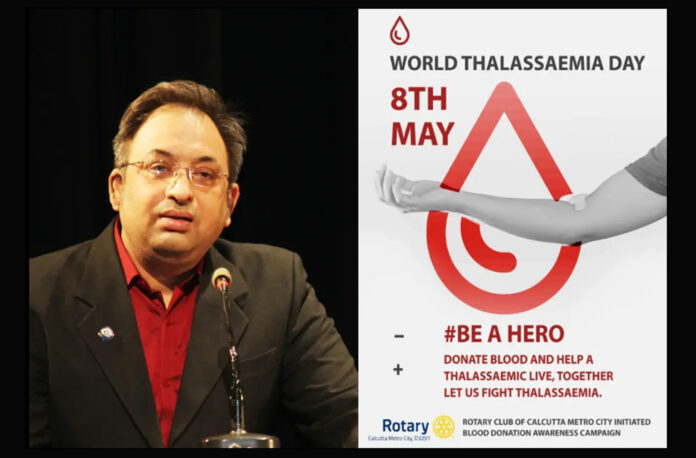New Delhi: Talking about the condition of thalassaemia in India, veteran activist and volunteer for thalassaemia Rotarian Subhojit Roy said, “We desperately need to create awareness about preventive health checks to eradicate thalassaemia otherwise due to ignorance this genetic disorder is being passed on to their children. We are desperately looking towards carrier detection tests being made mandatory.
India has approximately 40 million carriers and over 1,00,000 thalassaemia majors under blood transfusion every month. These figures are very worrisome and we urgently need a prevention and control programme at the national level. The disease can be prevented with the support of medical doctors specifically gynaecologists and every couple becoming more vigilant and screen for thalassaemia in every pregnant woman.
There is no known cure for thalassaemia except bone marrow transplant (BMT) and most of the patients in India do not have the finances to afford it nor do they have relevant matches with siblings or others. BMT can be done only for children up to the age of 10, after which it is a serious risk.
Private organizations, non profits, service organizations, parent-guardian bodies have been trying hard over the past few decades to build up awareness and build resources for those already reeling under pressure of continued treatment for those affected by Thalassaemia, though the Government medical facilities do have free transfusion and medicines, but the infra structure is hardly adequate and requires far greater impact in rural areas.
Mandatory blood carrier tests for determining thalassamia trait is the need of the hour as every year there are over 10,000 children born with thalassaemia and a law becomes vital to stem the growth, it is here where political and administrative will lacking in India, no one wants to swallow the bitter pill. All activities that usually take place is urban centric and fails to penetrate the rural population thereby further creating a health divide among the rural and urban population.
Subhojit Roy who had initiated in mid 90’s Rotary’s first International partnership on Thalassaemia with a partner club in Switzerland, says, “voluntary organizations need to quickly regroup and take the cause forward post pandemic in an urgent manner as the entire eco system of blood donation, CSR donations, awareness modules are under pressure with some of the major resources as schools, colleges, local clubs, social organizations are just about getting normalised. So the role of social organizations and volunteers as catalysts for such activity assume great importance and I feel this is an opportunity where these organizations can effectively fill the gap. The other logical step would be the awareness campaign for total eradication. We hope that one day India too shall have a law and a mechanism to eradicate thalassaemia just as it had eradicated Polio in 2014 with the partnership of all the stakeholders in the health sector,” Subhojit Roy concluded on the occasion of the World Thalassaemia Day observed every year on 8th May.
















